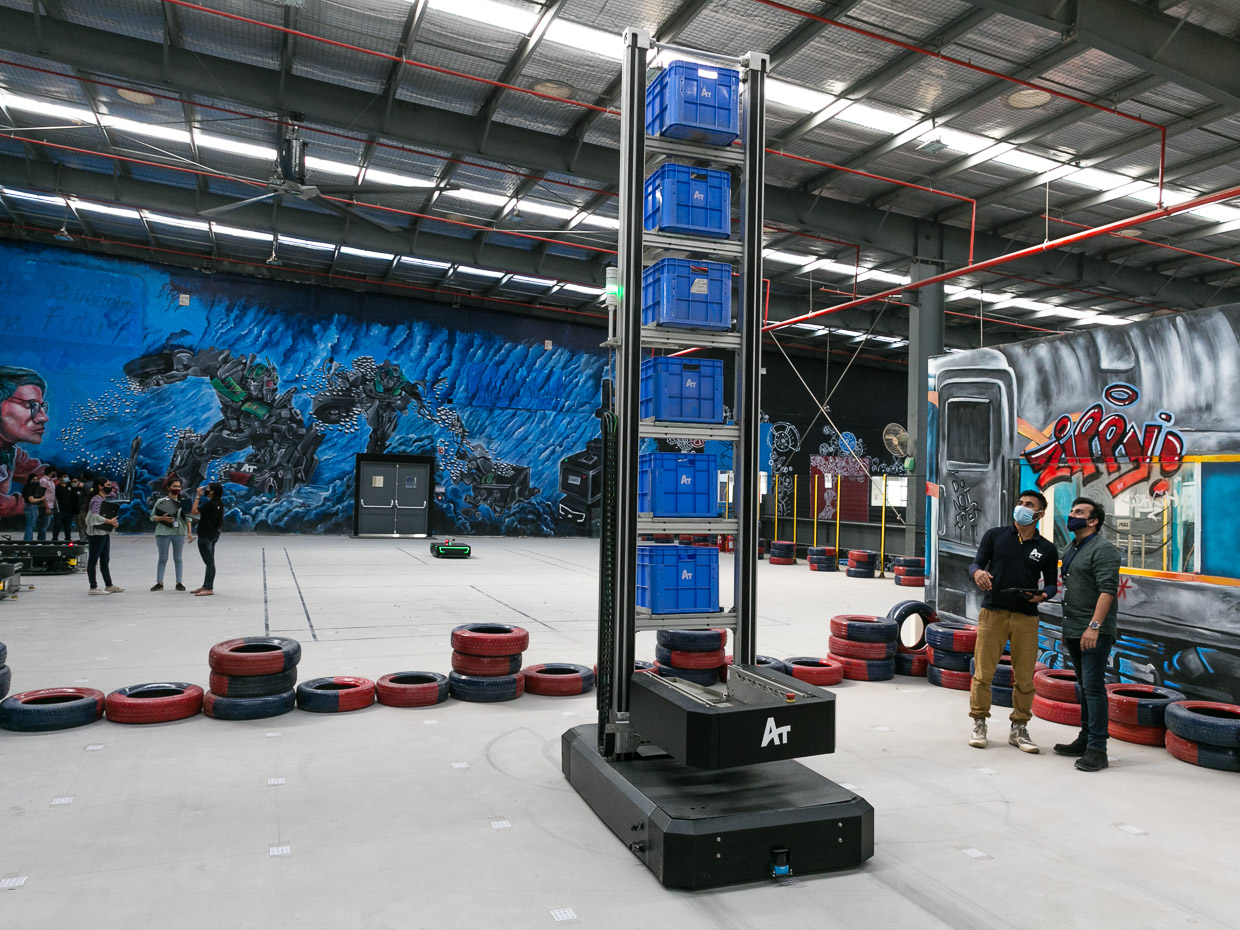
6 Applications of Autonomous Mobile Robots (AMRs) in Modern Supply Chains
Technology integration has become pivotal to achieving efficiency, accuracy, and flexibility in the dynamic landscape of modern supply chains. One remarkable advancement that has gained significant attention is the utilization of Autonomous Mobile Robots (AMRs). These intelligent robotic systems are transforming how businesses manage their supply chain operations. This article will delve into six educational applications of AMRs that are revolutionizing modern supply chains.
6 Supply Chain Applications of Autonomous Mobile Robots (AMRs)
1. Healthcare Material Handling & Transportation with AMRs
AMRs automate material handling and transportation processes in healthcare facilities. The robots seamlessly integrate into the logistical frameworks of healthcare warehouses and distribution centers, functioning as tireless workers that tirelessly transport vital medical supplies and equipment with unparalleled accuracy. This minimizes the risk of human errors that can occur with manual labor and streamlines the entire supply chain, leading to swifter delivery of medical necessities to where they are needed most. The introduction of AMRs optimizes resource allocation, reduces operational costs, and ultimately contributes to the seamless functioning of healthcare establishments in their mission to provide optimal patient care.
2. Retail Order Fulfillment
It’s no secret that the retail industry has been evolving rapidly in recent years as customer expectations become more demanding. Order picking and fulfillment are critical aspects of supply chain operations. The accuracy and speed of the order fulfillment process have the power to make or break customer relationships. AMRs can seamlessly integrate into this process by autonomously navigating through aisles, locating products, and picking them based on orders. This accelerates order fulfillment and minimizes errors, improving customer satisfaction and brand loyalty.
3. Grocery Inventory Management
In the grocery industry, there is a delicate balance between supply and demand, shaping the store’s success. Accurate inventory management is essential to prevent overstocking or stockouts. AMRs can be equipped with scanning and RFID technology to perform regular inventory checks. They can autonomously move through storage areas, scanning barcodes or RFID tags to update inventory data in real-time. This proactive approach to inventory management enhances grocery supply chain visibility and helps in better decision-making. AMRs help grocery stores stay ahead of the curve and elevate the consumer experience.
4. Quality Control & Inspection in Pharmaceuticals
Ensuring product quality is paramount in supply chains. The pharmaceutical industry demands unparalleled vigilance in quality control, and AMRs are proving to meet these demands. AMRs can be programmed to perform quality control checks and inspections on products. Equipped with cameras and sensors, these robots can identify defects, inconsistencies, or damages in products, ensuring that only high-quality items make it to the shipping stage. Improve your reputation for delivering pharmaceuticals of uncompromising quality, reaffirming the trust between healthcare professionals and patients alike.
5. Loading and Unloading AMRs For eCommerce Businesses
AMRs are a game changer for eCommerce businesses. The process of loading and unloading goods onto trucks and containers can be physically demanding and time-consuming. AMRs can simplify this process by autonomously transporting goods from storage to loading docks. They can also optimize loading patterns to maximize space utilization, reducing the number of trips required for transportation. AMRs alleviate the physical burden and foster seamless logistics, propelling e-commerce enterprises toward improved operational efficiency.
6. Collaborative AMRs in Manufacturing
AMRs are not limited to warehouse operations; they can also be crucial in manufacturing environments. Collaborative robots, sometimes called “cobots,” work alongside human workers to perform tasks requiring precision, repetition, or heavy lifting, thus freeing workers to perform more complex tasks. Collaborative robots can enhance productivity, worker safety, and overall manufacturing productivity.
Addverb x McMurray Stern Partnership: Offering Industry Leading AMRs
McMurray Stern has recently partnered with Addverb to offer enhanced Autonomous Mobile Robots (AMRs) that help supply chains automatically move materials for improved efficiency, safety, and storage capacity.
“McMurray Stern’s experience in integrated design-build lays a foundation for Addverb’s hardware and software innovations,” said Sriram Sridhar, Addverb’s Chief Revenue Officer. “McMurray Stern has a long legacy within the storage and micro fulfillment industry. We are looking to learn from their experience and work together to offer creative solutions to their customers.”
Final Thoughts
Autonomous Mobile Robots (AMRs) are reshaping modern supply chains through their ability to automate various tasks and processes. Useful in various industries, from material handling and transportation to order fulfillment and quality control, AMRs enhance supply chain operations leading to better efficiency, accuracy, and flexibility. As technology continues to evolve, we can expect even more innovative applications of AMRs in the ever-evolving world of supply chain management. Understanding these applications is crucial for businesses seeking to leverage the potential of AMRs to stay competitive and thrive in the future. Learn more about McMurray Stern’s Automated Storage and Retrieval Systems (ASRS) and solutions: https://mcmurraystern.com/automated-storage-retrieval/
Recent blogs
Explore Our Top Articles And The Latest Storage Trends, Where Industry Expertise Meets Innovation.